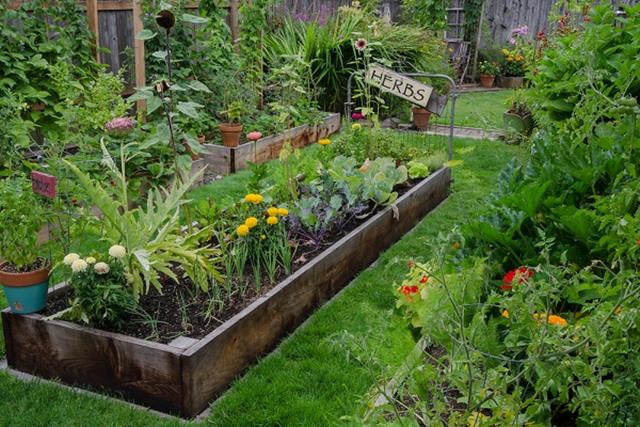Are you considering starting a vegetable garden? Have you heard about the benefits of raised bed vegetable gardening? Raised bed gardening is a popular method that offers numerous advantages for growing your own produce. In this article, we will explore the many benefits of raised bed vegetable gardening and provide tips for successful implementation.
One of the key benefits of raised bed vegetable gardening is the improved soil quality it provides. By using raised beds, gardeners can create their own soil mix, enhancing fertility and drainage for optimal plant growth. Additionally, raised beds offer better pest control and weed management compared to traditional gardening methods, making them an attractive option for those looking to minimize maintenance and maximize yield.
In addition to soil quality and pest control, raised bed gardening also offers accessibility and convenience. The elevated nature of the beds makes them easier to reach and tend to, especially for individuals with limited mobility. Furthermore, this method promotes increased yield and healthier plant growth, leading to a more bountiful harvest for gardeners. Stay tuned as we delve further into the specific advantages and techniques for successful raised bed vegetable gardening.
Advantages of Raised Bed Vegetable Gardening
Raised bed vegetable gardening offers numerous benefits that make it a popular choice for home gardeners. One of the main advantages is the improved soil quality, which allows for better drainage and aeration. The raised beds also warm up faster in the spring, allowing for an earlier planting season and extended growing season in the fall. This means that gardeners can enjoy fresh produce for a longer period of time.
In addition to improved soil quality, raised bed vegetable gardening also provides better pest control and weed management. Elevated beds make it more difficult for pests such as slugs and snails to reach the plants, reducing the risk of damage. Weeds are also easier to control in raised beds, as the confined space makes it simpler to spot and remove them before they become a problem.
Furthermore, the accessibility and convenience of raised bed vegetable gardening makes it an attractive option for gardeners of all ages and abilities. The raised height of the beds makes it easier to plant, water, weed, and harvest without having to bend or stoop, which is especially beneficial for those with limited mobility. It also allows for better organization and planning of crops, maximizing space efficiency.
| Advantages | Benefits |
|---|---|
| Improved Soil Quality | Better drainage and aeration |
| Pest Control | Reduces risk of damage from pests |
| Weed Management | Easier to spot and remove weeds |
Improved Soil Quality in Raised Bed Vegetable Gardening
Raised bed vegetable gardening offers numerous benefits, one of the most significant being the improvement of soil quality. By opting for raised beds, gardeners can have better control over the type and quality of soil used, leading to healthier and more productive plants.
Enhanced Drainage and Aeration
One of the key advantages of using raised beds is the ability to create optimal soil conditions for vegetable growth. With proper design and construction, raised beds offer improved drainage and aeration, preventing waterlogging and compacted soil. This promotes root health and allows for better uptake of nutrients, resulting in stronger and more resilient plants.
Customized Soil Mix
In traditional in-ground gardens, soil composition can vary widely and may require extensive amendments to reach ideal growing conditions. Alternatively, raised bed gardeners have the flexibility to customize their soil mix from scratch, incorporating the right balance of organic matter, sand, compost, and other additives. This tailored approach ensures that plants receive an optimal blend of nutrients while minimizing the risk of nutrient deficiencies or imbalances.
Reduced Soil Compaction
Another advantage of raised bed gardening is the prevention of soil compaction often seen in traditional gardens. The focused cultivation within a defined area allows gardeners to avoid walking on planting beds, preserving the soil structure and promoting healthy root development. As a result, the risk of compacted soil – which can hinder water infiltration and root growth – is significantly reduced.
Overall, improved soil quality in raised bed vegetable gardening translates to healthier plants with robust root systems, increased nutrient availability, and enhanced overall productivity. Gardeners who prioritize this aspect will undoubtedly reap the rewards in terms of plant health and bountiful harvests.
Better Pest Control and Weed Management in Raised Bed Vegetable Gardening
One of the key benefits of raised bed vegetable gardening is the improved ability to implement integrated pest management (IPM) practices. By creating a contained and elevated growing environment, gardeners can more effectively monitor and control pests that may damage their crops. This means less reliance on chemical pesticides and a greater emphasis on natural and non-toxic methods of pest control.
Weed Suppression
In traditional gardening, weeds can quickly take over and compete with vegetable plants for nutrients and water. However, raised bed gardening allows for better weed management by providing a defined space for plants and soil. With the use of mulch or ground cover, gardeners can suppress weed growth and maintain a cleaner and more organized garden space.
Natural Barriers
The elevated nature of raised beds also serves as a natural barrier against certain pests, such as ground-dwelling insects and burrowing animals. This additional layer of protection can reduce the risk of infestations and damage to vegetable crops, leading to healthier plants and higher yields.
By implementing raised bed vegetable gardening techniques, gardeners can enjoy not only the physical benefits of easier access but also the environmental benefits of reduced chemical usage, natural pest control methods, and improved overall plant health. These advantages contribute to a more sustainable and eco-friendly approach to vegetable cultivation.
Accessibility and Convenience of Raised Bed Vegetable Gardening
One of the key benefits of raised bed vegetable gardening is the accessibility and convenience it offers to gardeners. Raised beds are elevated, making them easier to access for planting, weeding, and harvesting. This is especially beneficial for individuals with mobility issues or back problems, as it reduces the need to bend over or kneel while working in the garden. The raised height also minimizes the risk of trampling on plants, leading to healthier crops.
In addition, the compact nature of raised beds allows for efficient space utilization, making it easier to plant and maintain a variety of vegetables in a small area. The close proximity of plants simplifies watering, fertilizing, and pest control measures, as everything is within reach. This not only saves time and effort but also makes it more convenient for gardeners to stay on top of their garden maintenance tasks.
Furthermore, raised beds can be built at a height that suits the gardener’s specific needs, whether they prefer waist-high beds or slightly lower ones. This customization allows for greater comfort while gardening and reduces strain on the body. Overall, the accessibility and convenience provided by raised bed vegetable gardening make it an attractive option for individuals looking for a low-maintenance yet productive gardening method.
| Benefit | Data |
|---|---|
| Improved Accessibility | Easier access for planting, weeding, and harvesting |
| Efficient Space Utilization | Allows for planting a variety of vegetables in a small area |
| Customizable Height | Can be built at a height that suits individual needs |
Increased Yield and Plant Health in Raised Bed Vegetable Gardening
Raised bed vegetable gardening offers numerous benefits, with increased yield and improved plant health being among the most significant advantages. By providing an optimal growing environment, raised beds can lead to healthier plants and higher vegetable yields. Here are some reasons why raised bed gardening contributes to increased yield and plant health:
1. Enhanced drainage and aeration: One of the key factors in promoting plant health is ensuring proper water drainage and oxygen circulation within the soil. Raised beds are elevated, allowing for better drainage and preventing waterlogging, which can lead to root rot and other issues. Additionally, the loose soil mixture in raised beds promotes better aeration, enabling roots to access oxygen more effectively.
2. Customizable soil quality: Raised bed gardening allows for greater control over the composition of the soil. Gardeners can create a tailored mix of topsoil, compost, and other organic materials to provide optimum nutrition for their vegetables. This customized soil promotes healthier root development and overall plant growth, leading to increased yield.
3. Reduced competition from weeds: The confined space of raised beds makes it easier to manage weeds compared to traditional ground-level gardens. With less competition for nutrients and sunlight, vegetable plants can thrive without being overshadowed or choked out by invasive weeds. This results in stronger, more productive plants and ultimately higher yields.
By embracing the benefits of raised bed vegetable gardening such as improved drainage, customizable soil quality, and reduced weed competition, gardeners can pave the way for increased yield and enhanced plant health in their home gardens.
Sustainable and Environmentally Friendly Practices in Raised Bed Vegetable Gardening
Raised bed vegetable gardening offers numerous benefits, including sustainable and environmentally friendly practices that can benefit both the planet and the gardener. Here are some of the key reasons why raised bed vegetable gardening is an eco-friendly gardening option:
- Water conservation: One of the significant advantages of raised bed gardening is the ability to conserve water. The confined space of raised beds allows for efficient watering, with less runoff and evaporation compared to traditional gardens. Additionally, using mulch in raised beds can further reduce water usage by helping to retain moisture in the soil.
- Reduced soil erosion: By raising the planting area above ground level, raised beds can help prevent soil erosion. This is particularly beneficial in areas with heavy rainfall or sloped terrain, where traditional gardens may be more susceptible to erosion.
- Minimized use of chemicals: Raised bed gardening often requires less pesticide and herbicide use than traditional gardens. The controlled environment of a raised bed makes it easier to manage pests and weeds without the need for harmful chemicals, promoting a healthier ecosystem.
In addition to these environmental benefits, raised bed vegetable gardening also promotes sustainability by utilizing resources efficiently and reducing waste production. Overall, embracing sustainable and environmentally friendly practices through raised bed vegetable gardening can contribute to a healthier garden ecosystem and help protect the environment for future generations.
Tips and Tricks for Successful Raised Bed Vegetable Gardening
Raised bed vegetable gardening offers numerous benefits that make it a popular choice for gardeners of all levels. One advantage is the ability to customize the soil quality, ensuring that plants have optimal growing conditions. By creating a raised bed, gardeners can add specific amendments to the soil, such as compost or organic matter, which leads to healthier and more productive plants.
In addition to improved soil quality, raised bed vegetable gardening also provides better pest control and weed management. The elevated nature of raised beds can deter some pests and make it easier to spot and remove others. This reduces the need for chemical pesticides, making it a more eco-friendly option. Furthermore, the confined space of raised beds makes it easier to manage weeds and keep them from taking over the garden.
Another benefit of raised bed vegetable gardening is its accessibility and convenience. Because they are elevated, these beds require less bending and kneeling, making them ideal for individuals with physical limitations. Additionally, the compact nature of raised beds allows for easy access from all sides, making planting, watering, and harvesting more efficient.
Overall, embracing the benefits of raised bed vegetable gardening can lead to a bountiful harvest while promoting sustainable and environmentally friendly practices. With the right tips and tricks in mind, anyone can successfully create and maintain a thriving raised bed vegetable garden.
Conclusion
In conclusion, raised bed vegetable gardening offers a multitude of benefits that make it an attractive option for both novice and experienced gardeners. The improved soil quality in raised beds allows for better drainage and aeration, leading to healthier plant growth and increased yields. Additionally, the raised bed design provides better pest control and weed management, reducing the need for harmful chemicals and minimizing the effort required to maintain a healthy garden.
Furthermore, the accessibility and convenience of raised bed gardening make it an ideal choice for individuals with physical limitations or limited space. The elevated nature of the beds also makes them more ergonomic to work with, reducing strain on the gardener’s back and knees. Moreover, embracing sustainable and environmentally friendly practices in raised bed gardening contributes to the overall health of our planet by reducing water usage, minimizing soil erosion, and promoting biodiversity.
As evidenced by these numerous advantages, raised bed vegetable gardening is a rewarding and practical method of cultivating a productive garden while simultaneously caring for the environment. By following the tips and tricks provided for successful raised bed gardening, individuals can create thriving gardens that not only provide fresh produce but also contribute to a healthier planet.
It is clear that embracing the benefits of raised bed vegetable gardening can lead to a more fulfilling gardening experience with sustainable long-term rewards.
Frequently Asked Questions
What Is the Advantage of a Raised Vegetable Garden?
The advantage of a raised vegetable garden is that it provides better drainage for the soil, prevents soil compaction, and offers easier access for planting, weeding, and harvesting.
Is It Better to Grow Vegetables in Raised Beds?
It can be better to grow vegetables in raised beds because they offer improved soil quality, better water retention, and increased control over the growing environment. They also provide a barrier against pests.
What Are the Disadvantages of a Raised Garden Bed?
Some disadvantages of a raised garden bed include the initial cost of construction or purchase, the need for regular maintenance such as topping up soil and mulch, and potential issues with uneven irrigation if not properly installed.

If you’re looking to get into vegetable gardening, or are just looking for some tips on how to make your current garden better, then you’ve come to the right place! My name is Ethel and I have been gardening for years. In this blog, I’m going to share with you some of my best tips on how to create a successful vegetable garden.





